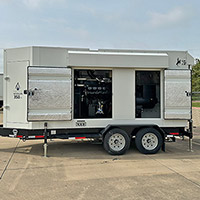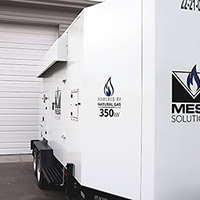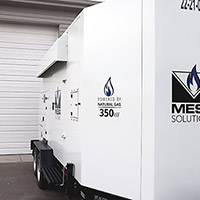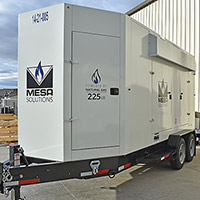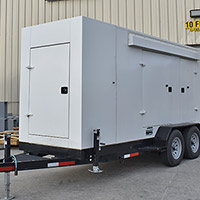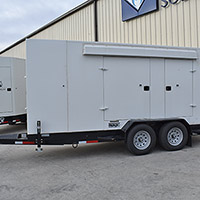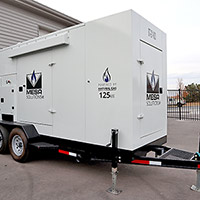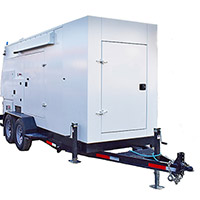Explore our collection of new and used industrial natural gas generators. We offer mobile, oilfield skids, weather enclosures, and open-skid generators from trusted brands like Caterpillar, Waukesha, Cummins, Hipower, Mesa Solutions, and Arrow.
Global Power Supply offers an extensive collection of commercial and industrial-grade natural gas generators for sale, ranging in size from 25kW to 2000kW. Explore our selection below to find the perfect unit for your needs. We guarantee top-quality products and solutions for our customers.
Before buying an industrial natural gas generator, you should understand your power generation needs, the benefits of natural gas, and the features that best suit your requirements. Below, we cover the key aspects that will help you find the generator that fits your needs.
Why Choose Natural Gas Powered Generators?
Natural gas generators are versatile and reliable options for a wide range of backup power needs. They can supply sufficient power for commercial businesses, homes, RVs, and other smaller utilities requiring electricity. Many people prefer natural gas over diesel due to its emissions and fuel availability.
Natural gas is just as dependable as other fuel types but stands out for its energy efficiency and accessibility. Natural gas generators are relatively affordable and easy to maintain. Plus, natural gas is often a cheaper fuel, which reduces overall operating costs.
Natural gas is also the cleanest burning fossil fuel available. It produces significantly lower emissions of nitrogen, carbon dioxide, and sulfur than other fuels.
Benefits of Using Natural Gas Generators
- Cost-Effective: Natural gas is often cheaper than diesel or gasoline, reducing overall operating costs.
- Convenience: They can be connected directly to existing natural gas lines. This creates a continuous supply through pipelines, reducing reliance on fuel storage and manual refueling.
- Environmentally Friendly: Natural gas generators are a more sustainable power source. They burn cleaner than other fossil fuels and produce fewer emissions of harmful pollutants such as nitrogen oxides, sulfur dioxide, and particulate matter.
- Reliability: These generators provide a steady supply of power and can run for extended periods without the need for refueling, ensuring uninterrupted operation. This makes them a good choice for a long-term backup power solution.
- Efficiency: Natural gas generators are highly efficient. They are considered to be one of the most adequate forms among the fossil fuel family for generating power since natural gas generators can meet the startup time required for emergency power systems.
- Reduced Maintenance: Natural gas burns more cleanly than burning coal or petroleum products, resulting in less carbon deposit buildup and fewer maintenance requirements.
- Quieter Operation: Natural gas generators typically operate more quietly than diesel or gasoline generators, making them more suitable for residential areas. While they run more quietly than other types, you may still want a quieter environment that will avoid constant exposure to generator sounds.
- No Need for Fuel Storage: By using a continuous supply from natural gas pipelines, there is no need for on-site fuel storage, reducing the risk of fuel spillage and contamination.
- Energy Security: With an extensive and reliable pipeline infrastructure, natural gas is widely available and less susceptible to supply disruptions compared to other fuel sources.
- Versatility: Natural gas generators can be used in a variety of applications, including residential, commercial, industrial, and emergency backup power, making them a versatile choice for different energy needs.
Drawbacks of Using Natural Gas Generators
- Availability During Natural Disasters: In the event of a major natural disaster, natural gas lines may be disrupted or damaged, potentially limiting the fuel supply to the generator.
- Initial Installation Cost: The installation of a natural gas generator, including connecting it to existing gas lines, can be more expensive than other types of generators.
- Lower Energy Density: Natural gas has a lower energy density compared to diesel or gasoline, meaning it may need more fuel to produce the same amount of energy.
- Regulatory and Safety Concerns: Strict regulations and safety standards should be followed when installing and operating natural gas generators. Although these generators avoid the issue of spillage, natural gas is highly flammable and explosive. To avoid hazardous conditions, you should carefully inspect the equipment to prevent leaks.
- Dependence on Utility Supply: Unlike diesel or gasoline generators that use stored fuel, natural gas generators rely on a continuous supply from utility companies, making them vulnerable to supply interruptions.
- Potential for Gas Leaks: Natural gas leaks can pose serious safety hazards, including fires and explosions, and so require diligent maintenance and monitoring.
- Noise and Emissions: While cleaner than other fossil fuels, natural gas generators still produce some emissions and can be noisy, potentially requiring additional measures for noise and emission control.
How to Buy the Right Natural Gas Generator
When choosing a commercial natural gas generator, consider the following factors:
- Power Requirements: Assess the wattage needed to run your business or facility. Calculate both the running wattage and the starting wattage of each appliance and system you want to power.
- Dependability: Evaluate the generator’s reliability by looking at the brand’s track record. Choose models with robust engines and high-quality components designed for continuous operation.
- Flexibility: Consider the generator’s ability to operate on additional types of fuel, such as liquid propane.
- Power Output: Ensure the generator can handle your calculated total wattage.
- Fuel Efficiency: Look for models with efficient fuel consumption to save on operating costs.
- Noise Level: Consider the noise output, especially for residential areas. Some models come with noise-reducing features.
- Durability: Choose a generator built with high-quality materials for long-term use.
- Professional Installation: Ensure standby generators are installed by certified professionals to guarantee safety and compliance with local codes.
- Regular Maintenance: Follow the manufacturer’s maintenance schedule, including regular oil changes, air filter replacements, and inspections. Also, regularly inspect the generator for leaks, wear, and other potential issues.
- Initial Cost: Include the cost of the generator, installation, and additional accessories like a transfer switch.
- Operating Costs: Factor in the cost of natural gas and regular maintenance.
- Warranty: Look for a generator with a comprehensive warranty to protect your investment.
- Proper Ventilation: Ensure the generator is installed in a well-ventilated area to prevent carbon monoxide buildup.
- Emergency Shutdown: Choose a generator with an emergency shutdown feature for added safety.
By considering these factors, you can make an informed decision when purchasing a natural gas generator, ensuring it meets your power needs and fits within your budget and installation requirements.
Understanding the kW Rating of a Generator
The kilowatt (kW) rating of a generator indicates the amount of electrical power it can produce. One kilowatt equals 1,000 watts. This rating helps determine the generator’s capacity to power various appliances, devices, and systems.
The kW rating represents the maximum electrical output the generator can deliver. It helps you understand the load capacity of the generator. A higher kW rating means the generator can power more or larger appliances simultaneously. For example, a generator with a 10 kW rating can produce up to 10,000 watts of power.
Types of kW Ratings
- Standby Power Rating (ESP): The maximum power a generator can supply for the duration of an emergency outage or other unpredictable situations. It is typically used for short-term power outages and emergency situations. Hospitals, data centers, and other critical infrastructure often rely on standby power ratings for backup during emergencies.
- Prime Power Rating (PRP): The maximum power a generator can provide continuously for an unlimited number of hours per year with variable loads. It is suitable for applications where the generator is the primary source of power, operating continuously or for extended periods, such as remote construction sites, mining operations, and off-grid locations where consistent power is needed.
- Continuous Power Rating (COP): The maximum power a generator can supply continuously at a constant load for an unlimited number of hours per year. This rating is designed for applications with a constant load and no fluctuations, such as industrial plants and factories that require a steady and reliable power supply.
The kW rating of a generator is a crucial factor in determining its suitability for different applications. By understanding the various types of kW ratings, you can select the right generator to meet your specific power requirements and ensure efficient and reliable operation.
Shop Natural Gas Generators from Trusted Brands
Investing in a natural gas generator offers peace of mind and ensures reliable power during outages. To make an informed decision, start by understanding your power needs, comparing key features, and weighing long-term costs and benefits. Consulting with a professional for installation and maintenance is crucial for safe and optimal operation.
Ready to secure your critical power infrastructure? Shop Global Power Supply for top-quality natural gas generators and enjoy unmatched performance and peace of mind. Explore our selection today!
